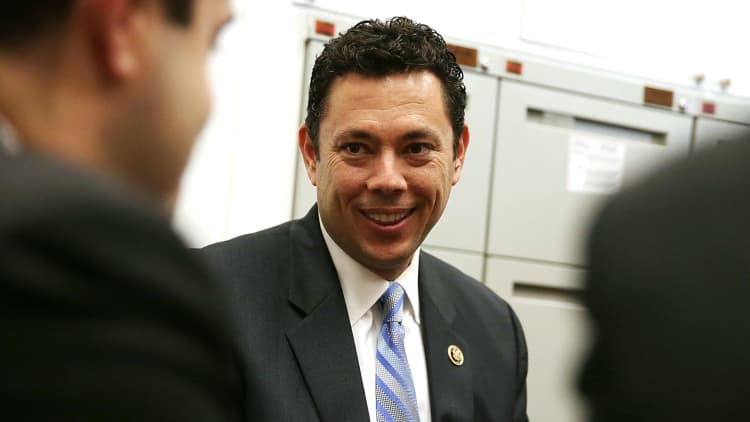On Tuesday, President Donald Trump again repeated his claim that U.S. citizens pay an unfairly high tax burden. "We're the highest taxed nation in the world," he said, according to NPR White House reporter Scott Horsley. "People want to see massive tax cuts."
In September, the President made the same assertion via Twitter in order to make the case for . "We are the highest taxed nation in the world — that will change," he wrote.
At a rally in Youngstown, Ohio, this summer, Trump again said that, in America, "we have the highest taxes in the world."
In reality, the United States has average or below average taxes compared to similar economies.
The Pulitzer Prize-winning fact-checking site Politifact.com calls the president's assertion, which he has been making for a couple of years now, "one of his most repeated falsehoods."
Regardless of how you measure the tax burden, the president's claim is not borne out by the facts. As measured by percentage of GDP, numerous European countries that provide more social services tax their citizens more heavily than the U.S. does, the BBC reports: "In 2015, the U.S. tax take came in at 26.4 percent of GDP, well below countries such as Italy at 43.3 percent, France at 45.5 percent and Denmark at 46.6 percent."
You can see this reflected in a chart by the Committee for a Responsible Federal Budget in 2016, which uses slightly different numbers. By their calculations, Denmark comes in at over 50 percent. But the U.S. remains steady at 26 percent, significantly below the average of 34 percent.
As such, America is actually "among the lowest-taxed countries in the OECD." The OECD, the Organisation for Economic Co-operation and Development, has 35 member countries, including the most advanced nations in the world.
In terms of how much individuals pay, Pew Research Center also reports that taxes in the U.S. are comparatively "low." Its research shows that "in all cases, the U.S. was below the 39-nation average — in some cases, well below," when it comes to taxes.
"A single, childless American making the average wage in 2014 ($50,099), for instance, paid 24.8 percent of her gross income in federal income tax and payroll taxes, versus the 39-country average of 27.3 percent. Such a person living in Belgium, by contrast, would pay 42.3 percent of her gross income," writes Pew.
"An American married couple, both working (one at the average wage, one at two-thirds of it) and with two kids, paid 19.4 percent of their gross income in taxes; a similar Belgian family would have paid nearly double that rate, or 38.3 percent."
And, according to World Atlas, which made its list using data from the World Bank, the countries with the highest taxes in the world include Aruba, Sweden, Denmark, the Netherlands and Belgium. The United States doesn't even make the top 10.
It's possible that the president means to refer solely to the corporate tax rate. Politifact adds that, in that case, he would be on more stable ground, since "the United States does have a higher corporate tax rate than most of its industrialized peers." However, the site goes on, "official tax rates are one thing, while the tax rates corporations actually pay can be substantially less. In practice, U.S. companies pay less because they can claim deductions and exclusions."
The president has made no such distinction in his speeches.
Forbes Tax Analysts contributor Robert Goulder suggests that Trump, by repeatedly stating as fact a data point that has been debunked, is trying to mislead crowds on purpose in order to advance an agenda. "If the masses can be convinced that they're grossly overtaxed relative to everyone else in the world, the case for tax reform becomes easier — or at least the case for tax cuts," he writes.
"In reality," Goulder writes, "the United States is among the least-taxed nations within the OECD."
This is an update of a previously published article.
Like this story? Like CNBC Make It on Facebook!
Don't miss:



